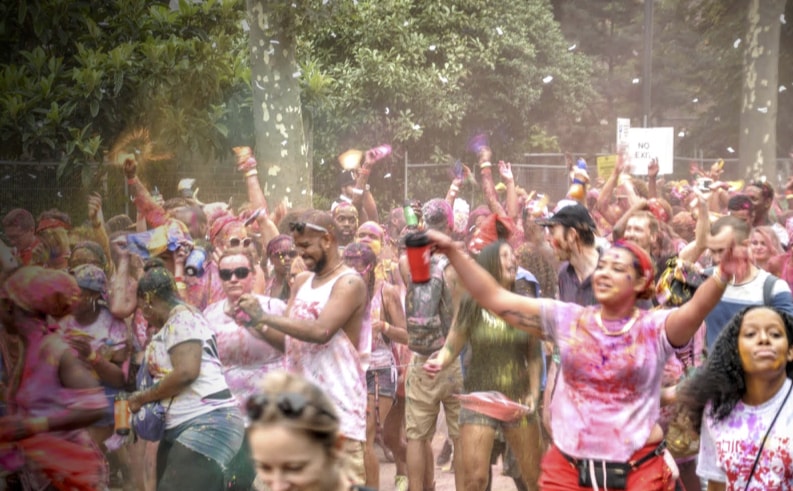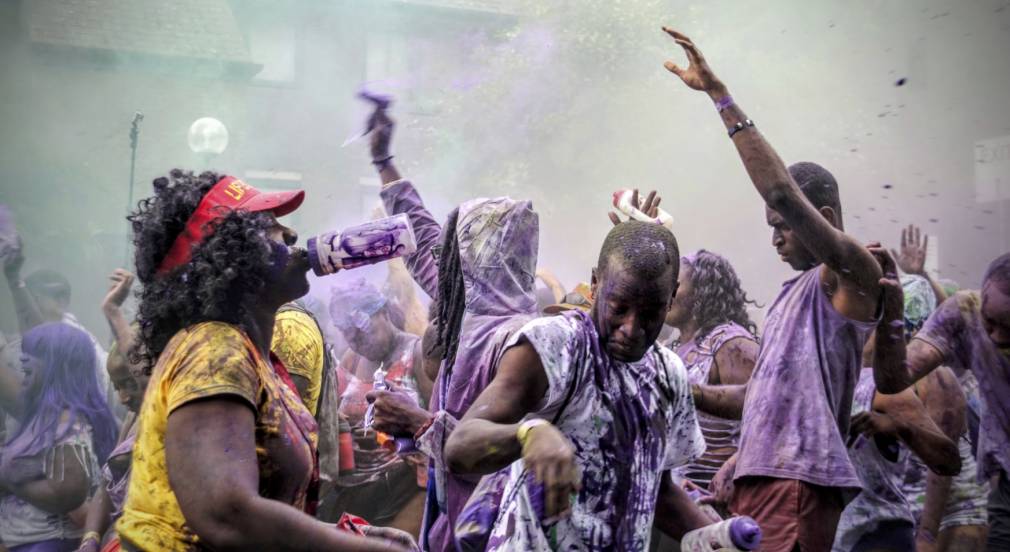It’s said that in Trinidad if people aren’t celebrating carnival then they are getting ready for it, and the festival that defines the twin island nation all begins with J’ouvert.
Pronounced “Jou-vay,” J’ouvert is Antillean creole and a compound of the French words `jour and `ouvert’ meaning daybreak. It is a pre-dawn libation in which revellers hit the streets to throw paint, powder, oil and grease at one another and generally “jump up” to the sound of steelbands and sound systems. Acknowledged across the diaspora from London to New York, J’ouvert is a depository of culture, history and memory and would normally be celebrated in Trinidad and Tobago on the Monday before Ash Wednesday.
To understand J’ouvert, and to respectfully acknowledge its absence this year, we must first understand the origins of carnival in The Carribean.
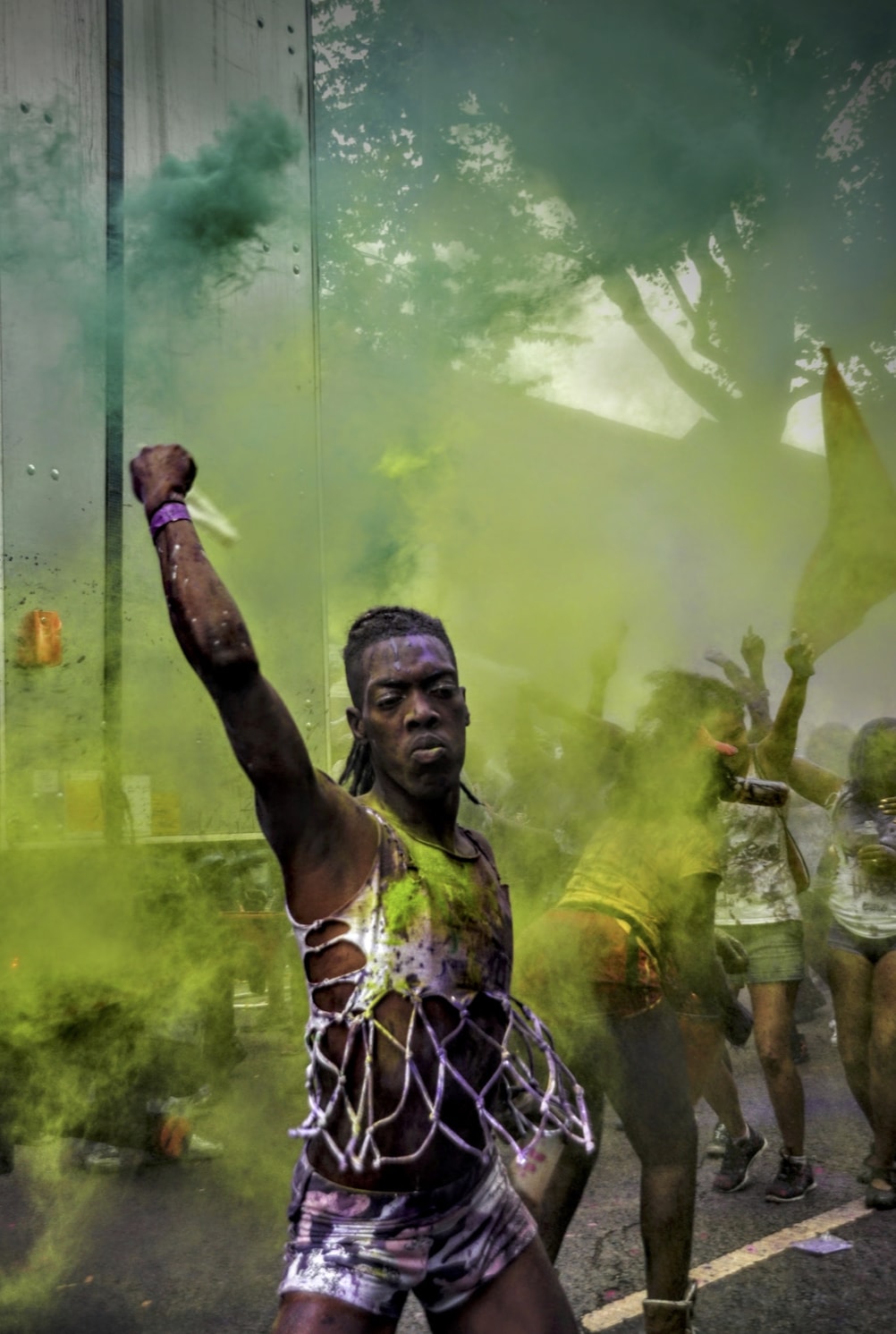
The bacchanal indulgence of carnival is thought to have been introduced to Trinidad by French colonisers in 1783 and featured masked balls in which plantation owners would dance, drink and be merry. The wild antics of these masquerades were a source of interest and amusement for enslaved West Africans who began staging their own mini-masquerades in their backyards, mocking and exaggerating the behaviour of the aristocrats and incorporating elements of their own rituals and folklore. With the abolition of slavery in 1838 carnival was thrown open to all and the street parties that were held to celebrate emancipation found their way into the annual festivities. Thus the euphoria of liberation was amplified by the traditional release provided by carnival.
So where does J’ouvert with it’s anarchy of paint and early morning revelry fit into this narrative? Well the anonymity of masquerades is a clue.
A feature of early Carnival was to over eat and drink ahead of the month of fasting with the festivities occasionally ending in food fights as the night wore on. Darkness, like masks, provides cover and indemnity to behave freely and without judgement, thus the significance of J’ouvert’s 4am start. Another Trinidadian element of J’ouvert is the carrying of flaming torches or “canne brulees” a remembrance of both the burning of sugar cane which marked slave revolts, and of the 1881 canboulay riots of Port of Spain. Some also posit that covering the body with paint and grease commemorates how rebels disguised themselves.
The pre-dawn cloak of J’ouvert also sets the scene for the emergence of masquerade characters (in the West African sense more than the European.) In Grenada J’ouvert is celebrated not in February, but in August during the ten day carnival of Spicemas, and a fixture of the parade is the terrifying Jab-Jab or Jab-Molassi. The Jab-Jab are a troupe of masqueraders who cover themselves in black molasses, tar, mud and little else except for a horned helmet. They represent devils, and their appearance out of the darkness of J’ouvert morning is pure performance art celebrating the grotesque and macabre. The character also exists in Trinidad and Tobago as “The blue devils” and the costume can even be spotted on the streets of West London where J’ouvert is celebrated on the last Sunday morning of August,preparing the road for the Notting Hill Carnival.
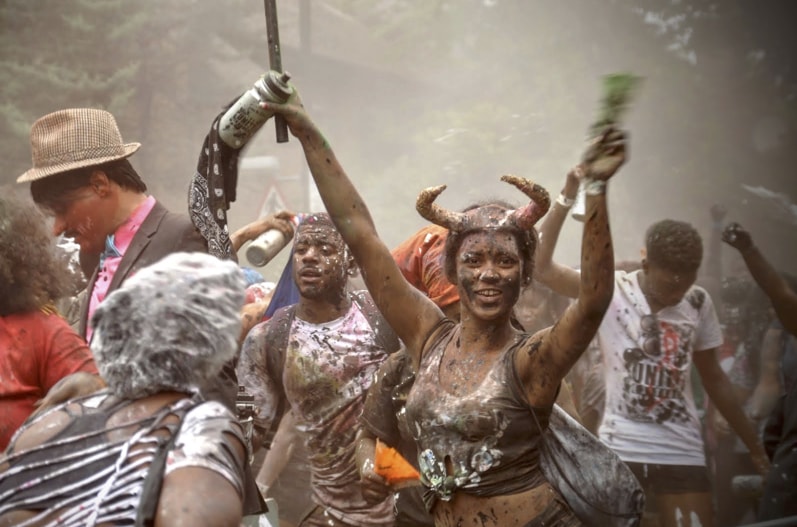
London’s Notting Hill Carnival began in the early nineteen sixties thanks to Trinidad-born activist and journalist Claudia Jones credited as `the mother of carnival’ in the UK. Conceived as a pan-island celebration to calm tensions following the 1958 Notting Hill race riots which were ignited by racially motivated attacks on members of London’s West Indian community, Notting Hill Carnival has grown into a yearly showcase of carnival arts and a celebration of multiculturalism. Matthew Philip the CEO of Notting Hill Carnival puts it thus; “The UK has got such a wide range of people from different Islands. That’s what built the community in Notting Hilll in the fifties and sixties. They were forced together but one thing they had in common was carnival.”
J’ouvert in London begins at the later but still early hour of 6am and in contrast to J’ouvert in Port of Spain the music is entirely acoustic, consisting of three to seven steelbands as Matthew explained to me via zoom; “In Trinidad it starts at 4am and continues until morning. After that you might see just the odd reveller out covered in paint and mud. The way we do J’ouvert is different. It’s from 6 to 9am but then we have the ‘dutty mas’ bands and it’s almost like J’ouvert continues into Sunday afternoon. It’s called dutty Mass as it’s about getting dirty rather than putting on the pretty costume.”
Dutty mass bands in London thus jump in the line with the “fancy” or “pretty mas” performers in their dazzling sequins and feathers as the parade route winds through Notting Hill and Ladbroke Grove continuing well into the afternoon. `Playing mas’ demands stamina!
Another difference is what’s in the air on J’ouvert morning.
“We use paint and powder. We don’t use oil which would be traditional. and some bands also use chocolate. They have a nut free chocolate! so there’s no allergies”
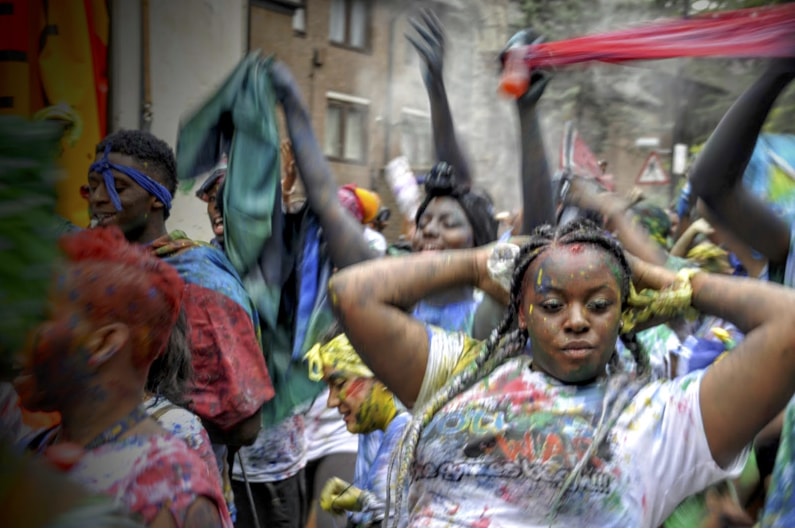
Though August 2020 marked the first time in fifty years Carnival didn’t take place, it nonetheless happened online with an impressive programme of performances, interviews and conversations as Matthew told us; “We were determined to highlight and celebrate carnival still and in doing so take the opportunity to educate people and give a bit of an insight into the behind the scenes of carnival. On a normal year if you’re a band leader or in a band, it’s hard to take it all in and see the wider carnival. 2020 though gave people within the carnival community the opportunity to see all the parts that they contribute to make it so great every year.”
Perhaps the most Pan-African of J’ouvert celebrations take place in Brooklyn where in New York J’ouvert takes place on Labor Day celebrated on the first Monday of September.
Carnival first arrived in Harlem in the forties moving on to Brooklyn in the sixties. In The United States of America they like to go big and by the seventies the parade had become an unwieldy mess (not mas) of a Labor Day parade with some carnival elements. In response, a group of Trinidadian pan players decided to organise an earlier parade, formally agreeing with the NYPD to organise a sound-system free J’ouvert parade up Flatbush Avenue and out of Empire Boulevard.
A refuge from the larger and sound system dominated daytime parade, J’ouvert in Brooklyn became a more rootical celebration, featuring djembe groups, steel bands and ole-mas characters through the filter of an African American identity not necessarily tied to a specific island.
A syncretic carnival emancipated from the rules of the Caribbean archipelago that gave birth to it.
